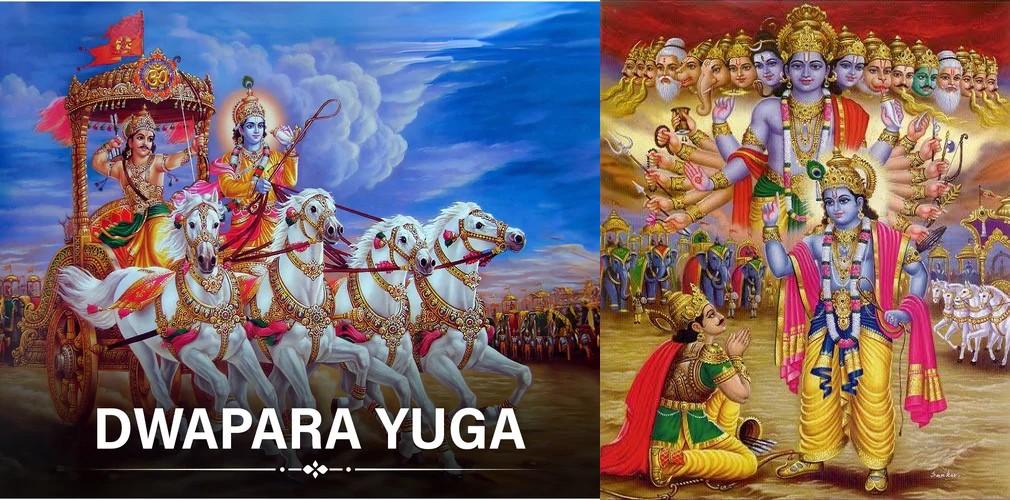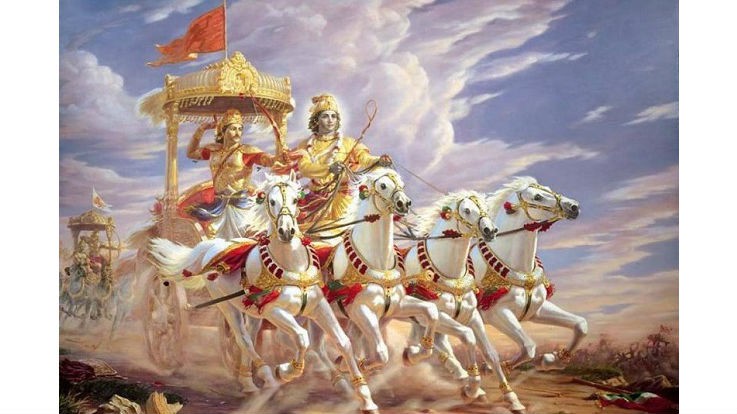A Story of Dvapara Yuga in Prose : ( part-1)
By Lokanath Mishra
In the latter half of the Dvapara Yuga, India was divided into many kingdoms. Some, like Magadha, were vast and powerful, while others, like Mathura, were small and weak. Even the chiefs of clusters of villages would sometimes call themselves kings. Among the great rulers, there was fierce competition to become the Chakravarti Samrat, the emperor of emperors. To claim this supreme title, one had to perform the grand Rajasuya Yajna.

Jarāsandha, the mighty king of Magadha, was among those who harbored this ambition. He was strong, clever in diplomacy, and had brought many kingdoms under his sway, either through conquest or alliances. Rulers who opposed him faced certain death, so most chose to submit as vassals rather than risk destruction.
At this time, Ugrasena of the Yadava dynasty ruled Mathura. While he was away on a military expedition, his queen, the beautiful Padmavati, went to bathe in the royal lake. The place was deserted, and as she swam, her garment slipped, revealing her youthful beauty through the water.
By chance, a Gandharva named Drumila, flying overhead as a messenger of Kubera, saw her. Overcome with desire, he assumed the form of King Ugrasena and appeared before her. Padmavati, believing her husband had returned unexpectedly, welcomed him with affection. For days she had suffered in separation from her true husband, and so she yielded to Drumila, thinking he was Ugrasena.

But after their union, when Drumila fell asleep, the magic of his disguise faded, and his true form was revealed. Padmavati was horrified. Enraged, she dragged him from the bed and demanded he reveal himself. Drumila confessed and tried to console her, saying that a son would be born from her womb — a radiant Gandharva child.
Furious, Padmavati cursed him: “This child, born of deceit, will not be a Gandharva. He shall be a Rakshasa!” Drumila, frightened of further curses, fled.
When King Ugrasena returned victorious, Padmavati was unable to greet him, overwhelmed by guilt and sorrow. Seeing her grief, Ugrasena pressed her for the truth. She confessed everything and even spoke of ending her life to wash away the sin. But Ugrasena consoled her gently:
“You are blameless. You believed him to be your husband. Do not condemn yourself. Put aside this sorrow.”
Though she calmed down, the bitterness of her curse remained, and in time it shaped the nature of the child in her womb.
A healthy, handsome boy was born, and priests were called to name him. With grand ceremony, he was given the name Kansa.
Kansa was no ordinary child. In his former birth, he had been Kalanemi, an asura. During the Treta Yuga, when Hanuman was fetching the Sanjivani herb to save Lakshmana, Kalanemi had tried to obstruct him. Hanuman hurled him away, but he did not die. Longing for invincibility, Kalanemi performed great austerities and won a boon from Brahma that no god, not even Vishnu, would kill him. Brahma, however, warned that this would not hold true in that birth — only in the next.
And so, when Kansa reached youth in his new life, the strength of those past austerities awakened within him. He trained as a wrestler under the finest Yadava masters. After defeating his teachers, he roamed far and wide, challenging the greatest wrestlers of the age. One by one he subdued them, either bringing them under his command or forging alliances.
Through this, he gathered powerful allies: Keshi, Chanura, Mushtika, Vatsasura, Bakasura, his sister Putana, and others. He befriended Banasura, Narakasura, and Kalayavana. His deeds grew ever more cruel, and the Yadava prince came to be known as Kamsasura.

In Mathura, asuras began to outnumber the Yadavas themselves. Kansa’s demonic friends encouraged his wickedness, shaping him into a tyrant. The Yadavas grew restless and condemned his behavior, but Kansa ignored his father Ugrasena and openly sided with the asuras.
Meanwhile, in Hastinapura, Dhritarashtra sat on the throne. Born blind, he had once been passed over in favor of his younger brother Pandu, but out of compassion, Pandu himself had later restored the crown to him. Pandu agreed to defend the kingdom’s borders, while Dhritarashtra ruled with the help of Bhishma, Vidura, and other wise counselors.
Pandu retired to the forest with his two wives, Kunti and Madri. Skilled in archery, he once mistakenly killed a sage disguised as a deer. Before dying, the sage cursed him:
“You too shall die in the act of union with your wife.”
Pandu, heartbroken, renounced conjugal life. But this left him and his wives without children. One day, the sage Vyasa came to console them. He reminded Kunti of the boon she had once received from Sage Durvasa, a mantra by which she could summon gods to beget divine sons.
With Pandu’s consent, Kunti invoked Dharma, and soon Yudhishthira, the first of the Pandavas, was born.
At this time, Jarasandha of Magadha grew more powerful and sought to conquer Hastinapura. But Bhishma, the grandsire of the Kuru dynasty, was still alive. He was a warrior of unmatched valor, even one who had once defeated Parashurama himself. Gifted with the boon of choosing the moment of his death, he was unassailable. For this reason, even Jarasandha, with all his ambition, dared not march against Hastinapura.
⸻( to be continued)
The Life of Krishna Beyond Kansa


Pingback: A story of Dvapara Yuga in Prose ( part-2) - UniverseHeaven
Pingback: A story of Dvapara Yuga in Prose : - UniverseHeaven